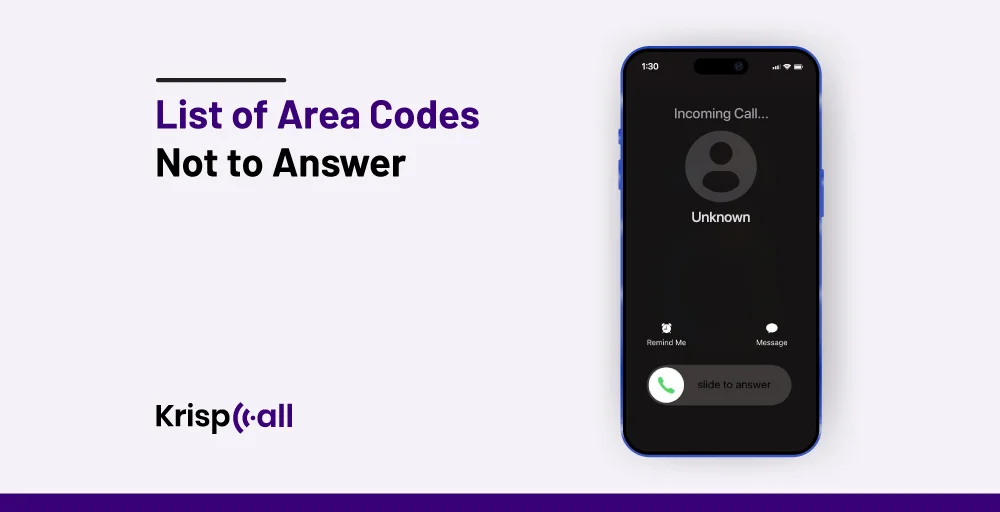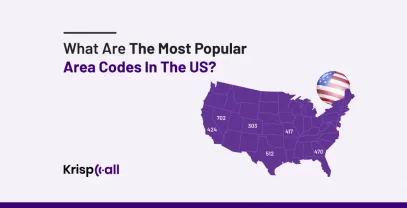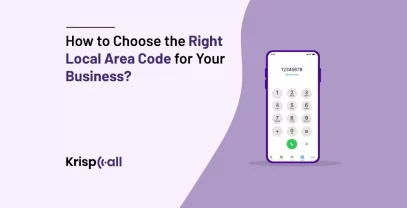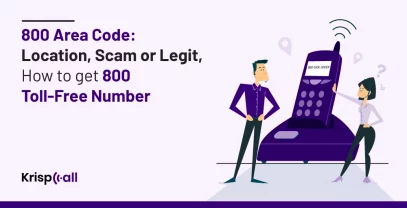Tired of annoying calls? – The ones that claim you have won millions of dollars or a luxurious car. 😫
Data from Truecaller shows that Americans receive 2 billion calls monthly as spam or unwanted.
You must have noticed that some phone numbers have a code at the beginning; they are called area codes. Scammers use tricky strategies to steal your personal details and money, making it look like they are calling from your area.
Knowing some of the area codes can save you – and that’s exactly what this blog is all about🤩
In this blog, we’ve provided a list of area codes not to answer, scams associated with these codes, and some pro tips for protecting yourself from scam calls.
🔑 KEY HIGHLIGHTS
- Area codes are numerical prefixes that identify phone numbers based on geographic regions.
- Never answer phone calls from the following area codes: 876, 284, 809, 232, 664, 849, and 649.
- Some common phone scams associated with area codes include One-ring scams, lottery scams, and phishing calls.
- You can register your number in the Do Not Call registry or use Call Blocking apps to avoid scam calls.
Never Answer Phone Calls from These Area Codes
Until and unless you expect calls, be alert of incoming calls from these area codes. A high number of phone scam and fraud calls are initiated from these countries: 👇
- 876 – Jamaica
- 829 – Dominican Republic
- 268 – Antigua and Barbuda
- 284 – British Virgin Islands
- 473 – Grenada, Carriacou and Petite Martinique
- 809 – British Virgin Islands
- 232 – Sierra Leone
- 649 – Turks and Caicos Islands
- 664 – Montserrat
- 767 – Commonwealth of Dominica
- 849 – Dominican Republic
Why Do Scammers Use These Numbers?
If you take a closer look at these numbers, they are mostly based in the Caribbean, meaning they all have the country code +1, similar to the USA. The receivers perceive these numbers as being from the USA, which leads to more trust and makes them receive the call.
What Kind of Scams are Associated with these Phone Numbers?
A lot of scams are associated with these area codes. However, here are some of the most common phone scams that you should be alert of: 👇
One Ring Scam
The One Ring Scam, where scammers use robocalls to your phone number and end the call before answering calls. With that curiosity, the receiver calls back to that number and is immediately charged with an expensive rate for every minute when the connection is established. It doesn’t matter; you’ll be charged even if you hang up the call instantly. Talking about the cost, you’ll be charged around $50 on average with One Ring Scam.
Scammers readily have a list of phone numbers with certain area codes and can call them in minutes using an autodialer. This increases the chances of someone on the list receiving or calling back. The One Ring Scam is difficult to track, and the victims are unaware until their large phone bill arrives.
Lottery or Prize Scams
Lottery Scams are the most common scams we’ve seen so far. You get a phone call, text messages, or email saying you won millions of dollars in the lottery or something like you won a smartphone or even a car in these scams.
After that, scammers will ask you to pay a certain amount to claim the price or ask for your bank details. Additionally, Lottery and Prize scams are difficult to detect since the fraudsters use fake names and companies to trick people.
Work From Home Scams
In a work-from-home scam, scammers create fake job opportunities to gain a financial advantage. These phone scams usually attract victims who can earn tons of money working in their comfort zone.
During the COVID-19 pandemic, work-from-home scams were prevalent, especially in industries such as data entry. These scams are often fraudulent and involve scammers requesting payment upfront and then disappearing. Additionally, they may ask for personal information which can be used for fraudulent activities.
Phishing Calls
Phishing Calls (Vishing) are scam calls in which scammers ask you to reveal your personal and sensitive information through phone calls, emails, or websites. The scammers make you believe that the call is from a trusted source or pretend to be someone you know to obtain information.
Moreover, Scammers often ask you to click on infected links, install viruses, or share OTPs to hack the operating system for criminal activities.
Unsolicited calls
Have you ever received a false call from unfamiliar numbers from an organization offering guidance without your request? – That’s called Unsolicited calls. Scammers often claim themselves from a government agency or from a financial institution and ask you for personal and bank details.
One example of unsolicited calls is receiving a call from certain area codes, someone claiming to be an IT professional who says your computer has a virus. They may ask for money to fix the issue or attempt to inject infected software to hack your system.
Utility Scams
Scammers often call and falsely claim you have unpaid utility bills for electricity or water. Many individuals fall for scams that threaten service interruption if they don’t make a payment immediately. They even ask you to transfer the amount into a personal account that is nearly impossible to get back.
How to Protect Yourself from These Scam Callers?
Safeguarding from scam callers has been extremely important for you. Here are some practical steps you can take to falling victim to their tricks: 👇
Don’t answer calls from these numbers
It’s better not to answer calls with the area codes mentioned above. Also, try to avoid calls from suspicious or spam numbers until and unless you expect them. If someone needs to contact you urgently, they will leave a message or find another medium to do so.
Don’t call back
You don’t want your phone bill to grow up as a result of calling back suspicious numbers. It’s always better to stay alert and avoid calls from suspicious numbers until and unless you’re expecting them.
Block the number
It is recommended that any suspicious numbers be blocked immediately, which can be done using the built-in call blocking feature available on most devices. Moreover, you can report the number to the concerned authorities to avoid such incidents further.
Report to the FCC (Federal Communications Commission)
The FCC is an independent government agency that monitors and regulates communication in the United States. You can easily report scam calls or suspicious numbers to the FCC, where they significantly make strategies to eliminate these incidents. Also, the FCC provides you guidance and instructions on how you can be safe from these scam calls.
Register your number on the Do Not Call Registry
The Do Not Call Registry is a number list that people add themselves to if they do not want to be contacted with sales calls they did not ask for. This is usually considered good practice for a company to avoid making these calls.
Use call blocking apps
There are many third-party call-blocking apps available on the market. If you’re receiving a lot of spam calls, you can use the best call blocking app to stop scam calls in your phone. These apps are pretty simple to use and can help you identify and block unwanted calls. Moreover, they let you report scam calls to the relevant authorities.
Final Thoughts: Beware of Phone Scams from These Numbers
Being aware of these area codes associated with scam calls is necessary to prevent potential threats. Avoid providing your personal and sensitive information to unknown callers. If you find something suspicious about a call, immediately block that phone number and report the issue to the concerned authorities.
In addition, you can use a reliable Call Blocking app that not only blocks calls but also reports them as spam and forwards them to the relevant authorities, significantly helping to prevent scam calls.
KrispCall: Secure Yourself from Scam Calls
KrispCall’s Call Blocking feature is the only thing you need to block and filter unwanted or Scam Calls. With the ability to screen calls, you can seamlessly filter unwanted calls, and you’ll never need to deal with the same number again. Whether you’re a businessperson or a normal individual, you can invest your crucial time in other tasks and let KrispCall handle unwanted calls that are troubling you.
In addition, the KrispCall custom caller ID feature protects your actual number and preserves your privacy, ensuring a reliable and secure service that safeguards your personal information from being exposed to unwanted callers or potential security threats.
So, what’s stopping you? Book a free KrispCall’s demo 🤩
FAQ
Do spam callers use your area code?
There is a method called “spoofing” caller ID that spam callers can use to use your area code. Using spoofing, scammers can call from numbers that share the same area code as yours and sometimes even the same prefix.
What area codes to avoid answering?
The area codes to avoid answering are 849, 268, 473, 829, 767, 809, 876, 232, 664, and 284.
What happens if you answer a spam call?
If you answer a spam call, spammers will ask for your personal and sensitive data, and even just answering spam calls can cost you a huge amount. Also, you’re more likely to get more spam calls if you answer them.
How can you tell a scammer number?
You can identify a scammer number by checking area codes and numbers, searching the number on the internet, and using Call Blocking apps.





